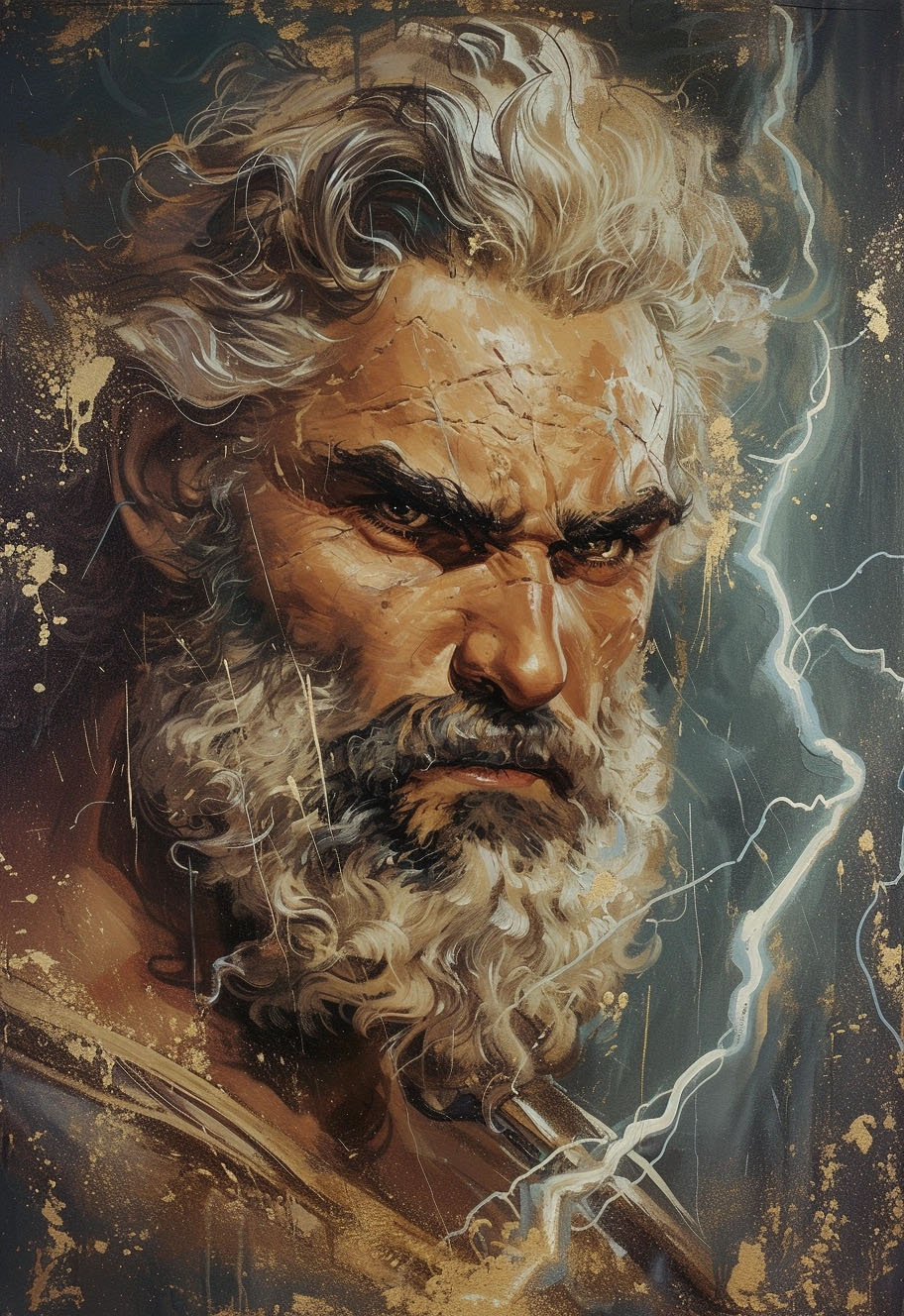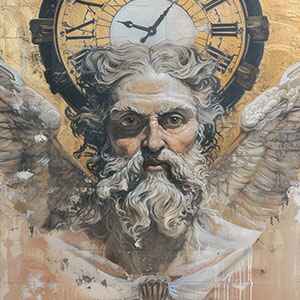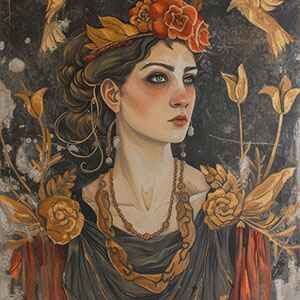Zeus
In Greek mythology, Zeus is the king of the gods and the ruler of Mount Olympus, the highest peak in Greece. He is the supreme deity of the Olympian pantheon and the god of the sky, lightning, thunder, law, order, and justice. Zeus is one of the twelve Olympian gods and plays a central role in many myths. Here are key aspects of Zeus in Greek mythology:
Parents: Cronus & Rhea
Siblings: Hestia, Hera, Demeter, Poseidon, Hades
Consort: Hera
Children: Ares, Hebe, Hephaestus, and many others

Parentage: Zeus is the son of Cronus and Rhea, making him a member of the second generation of the Olympian gods. Cronus, fearing a prophecy that one of his children would overthrow him, had swallowed his previous children, but Rhea managed to save Zeus by tricking Cronus.
Overthrow of Cronus: With the help of his mother, Rhea, and the Cyclopes, Zeus overthrew his father, Cronus, who had been ruling the cosmos. The Titanomachy, a great war between the Olympian gods and the Titans, ensued, resulting in the victory of the Olympians and Zeus becoming the ruler of the cosmos.
King of the Gods: Zeus became the king of the gods, with his siblings Hestia, Hera, Demeter, Poseidon, and Hades as fellow Olympians. He divided the realms among them, with Zeus ruling the sky and heavens.
Symbols and Attributes: Zeus is commonly depicted with a thunderbolt, a sceptre, and an eagle. The thunderbolt is his primary weapon, symbolising his control over lightning and storms. The eagle is his sacred bird.
Marriage to Hera: Zeus married his sister Hera, who became the queen of the gods. Their union produced several divine offspring, including Ares, Hebe, and Hephaestus.
Affairs and Offspring: Zeus had numerous extramarital affairs and fathered many demigods and legendary heroes, including Heracles (Hercules), Perseus, Helen of Troy, and many others.
Omnipotence and Omnipresence: Zeus is considered the most powerful of the gods and is often described as omnipotent and omnipresent. He can shape-shift, control the weather, and intervene in the affairs of both gods and mortals.
Oracle at Dodona: Zeus was associated with the oracle at Dodona, where priests interpreted the rustling of oak leaves to provide guidance and prophecies.
Punishments and Rewards: Zeus was known for both punishing wrongdoing and rewarding virtue. He could send thunderbolts to smite his enemies and was the arbiter of justice among the gods.
Role in Myths: Zeus is a central figure in many myths, including the Titanomachy, the Gigantomachy, and various stories involving mortal heroes and their interactions with the divine.
Cultural Influence: Zeus' image and myths have left an indelible mark on Western art, literature, and culture. He is often cited as a symbol of power and authority.
Roman Equivalent: In Roman mythology, Zeus is identified with Jupiter, the king of the gods.
Zeus' prominence in Greek mythology reflects the importance of his role as the ruler of the gods and the cosmic order. His influence extended beyond the divine realm, shaping the destiny of mortals and providing a moral and legal framework for both gods and humans.
Immediate Family
Quick Facts
- He is the king of the gods.
- Zeus overthrew his father, Cronus.
- He wields a thunderbolt as his primary weapon.
- Zeus married his sister, Hera.
- He had numerous affairs and fathered many demigods.
- Zeus is considered omnipotent and omnipresent.
- Associated with the oracle at Dodona.
- Known for both punishing wrongdoing and rewarding virtue.
- Central figure in many myths.
- Zeus' image and myths have left a cultural influence.
- In Roman mythology, Zeus is identified with Jupiter.
Further Reading
Art &
Architecture
Ancient Greek art and architecture, with its harmonious proportions and timeless elegance, continue to inspire awe and admiration millennia later.
Discover
Greek Mythology & Mythical Characters
Greek mythology, a rich tapestry of gods, heroes, and mythical creatures, captivates the imagination with its tales of love, betrayal, and epic adventures that delve into the depths of the human psyche.
Discover
Ancient Greek History
Ancient Greek history, marked by remarkable achievements in democracy, philosophy, and warfare, shaped the foundation of Western civilization, leaving an indelible legacy of innovation and cultural influence that continues to resonate to this day.
Discover
Ancient Greek Olympics
The ancient Greek Olympics, held in Olympia every four years, celebrated athleticism, unity, and cultural pride, serving as a testament to the enduring spirit of competition and excellence that transcends time and borders.
Discover
Ancient Greek Wars
Ancient Greek wars, such as the Persian Wars and the Peloponnesian War, were pivotal conflicts that shaped the course of history, highlighting the struggle for power, independence, and the clash of civilizations in the ancient Mediterranean world.
Discover
Ancient Greek Culture and Society
Ancient Greek culture and society, characterized by its emphasis on art, philosophy, and civic engagement, fostered a vibrant intellectual and social landscape where innovation flourished, democracy thrived, and the pursuit of knowledge and excellence was celebrated as fundamental values of civilized life.
Discover

